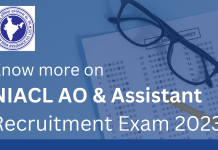What is the Right to Information?
The Right to Information Act of 2005 is a link between the government and the citizens of India. It is a right guaranteed to the people that connects the citizens to their government. The Right to Information Act is an important topic not only for General Awareness but also for Law Officer exams.
In this article, we will outline the gist of the Right to Information Act, its objectives and its purposes. This topic is important for exams like FCI AGM (Law), NABARD Grade A Legal Officer and SEBI Grade A Legal Officer among others. This topic may also be assessed in competitive examinations as part of the General Awareness syllabus.
The Objectives of the Right to Information
Possessing knowledge of the workings of the government is a basic right guaranteed to the citizens of every democracy. In a democracy, the government must keep its functions and work clear and limpid. In India, this transparency is offered through the Right to Information Act. The objectives of the RTI Act of 2005 have been listed below.
- Accountability
- Transparency
- Strengthen democratic principles of polity
- Reduce corruption
All the aforementioned objectives are related to each other. The RTI ensures that the government is amenable and accountable to its people. This accountability is guaranteed through transparency wherein citizens have the right to demand information about any functions of the government. Only if you know about something, can you take the necessary action for the same.
The democratic principles of state polity will be strengthened through answerability and transparency. In a democracy, the power lies with the people. Similarly, the government is answerable to its people. Finally, through transparency and accountability, overall corruption can be reduced. Since the functions and workings of the government have been made transparent, the scope for corruption becomes limited.
Right to Information and the Indian Constitution
The RTI Act and the Indian Constitution work in tandem. The RTI Act which is a Fundamental Right is derived from Article 19 (1) (a) that deals with the Freedoms of Speech and Expression. The RTI was interpreted from this Fundamental Right that recognizes that people need to know things that are going on around them.
The RTI is available only to the citizens of India. To make an application before any public authority, the applicant must be a citizen of India.
RTI and Good Governance
How is good governance ensured through the RTI?
The first and foremost aspect of maintaining accountability and transparency with the citizens of India is by educating them. Citizens must know about what is going on in the country, how the government functions, the various schemes and projects undertaken by the government to name a few through which the government becomes accountable to its citizens. As we can see, the relationship between RTI and good governance is quite closely related to the objectives of the Right to Information Act.
System of Checks and Balances
The system of checks and balances is linked to the RTI. This system has been devised to avoid any unpredictable or anti-democratic use of power. Checks and balances have been issued on the three organs of the government, i.e., Legislature, Executive and Judiciary, by giving each of them powers over each other. The RTI is one way in which the powers and activities of the organs of the government are kept under check.
Right to Information Act- Procedure
- As aforementioned, you must be a citizen of India to apply.
- A Web Portal has been set up where citizens can send in their applications.
- After paying the requisite fee, the application is submitted.
- The appropriate Ministry/Department must revert within 30 days.
- If the information is related to somebody’s life and/or liberty, then the information must be provided within 48 hours.
There are, however, some exceptions to the RTI. In certain cases, the government can withhold information from the public. These exceptions or exemptions can be exercised in case the disclosure of information comprises the sovereignty of India, its security or if the information asked has been received in confidence from a foreign country among other cases. You can study the Official Secrets Act of 1923 to understand the exceptions to RTI better.
Right to Information Act Trivia
- There are two Information Commissions established at the center and state levels.
- The Central Information Commission (CIC) is under the control of the President.
- The State Information Commission (SIC) is under the control of the Governor.
- The CIC is headed by the Chief Information Commissioner.
- Wajahat Habibullah was the first Chief Information Commissioner of India.
- Yashwardhan Kumar Sinha is the present incumbent.
- Every government organization/department appoints a Public Information Officer (PIO).
- According to an article published in ‘The Print,’ between 40 and 60 lakh RTI applications are filed every year.
If you are preparing for any government Law Officer exams, you should read the entire act as it is an important topic. You can find all updates on Current Affairs and General Awareness on ixamBee’s BeePedia page. These updates are exhaustive, free and can be downloaded in PDF format. These BeePedia updates are also available in Hindi.
At ixamBee you can find free Online Test Series, GK updates in the form of BeePedia, as well as latest updates for Bank PO, Bank Clerk, SSC, RBI, NABARD and Other Government Jobs.
Also read
Evolution of the Panchayati Raj System in India
All Government Exams for Law Officers
List of Nobel Prize Winners from India















